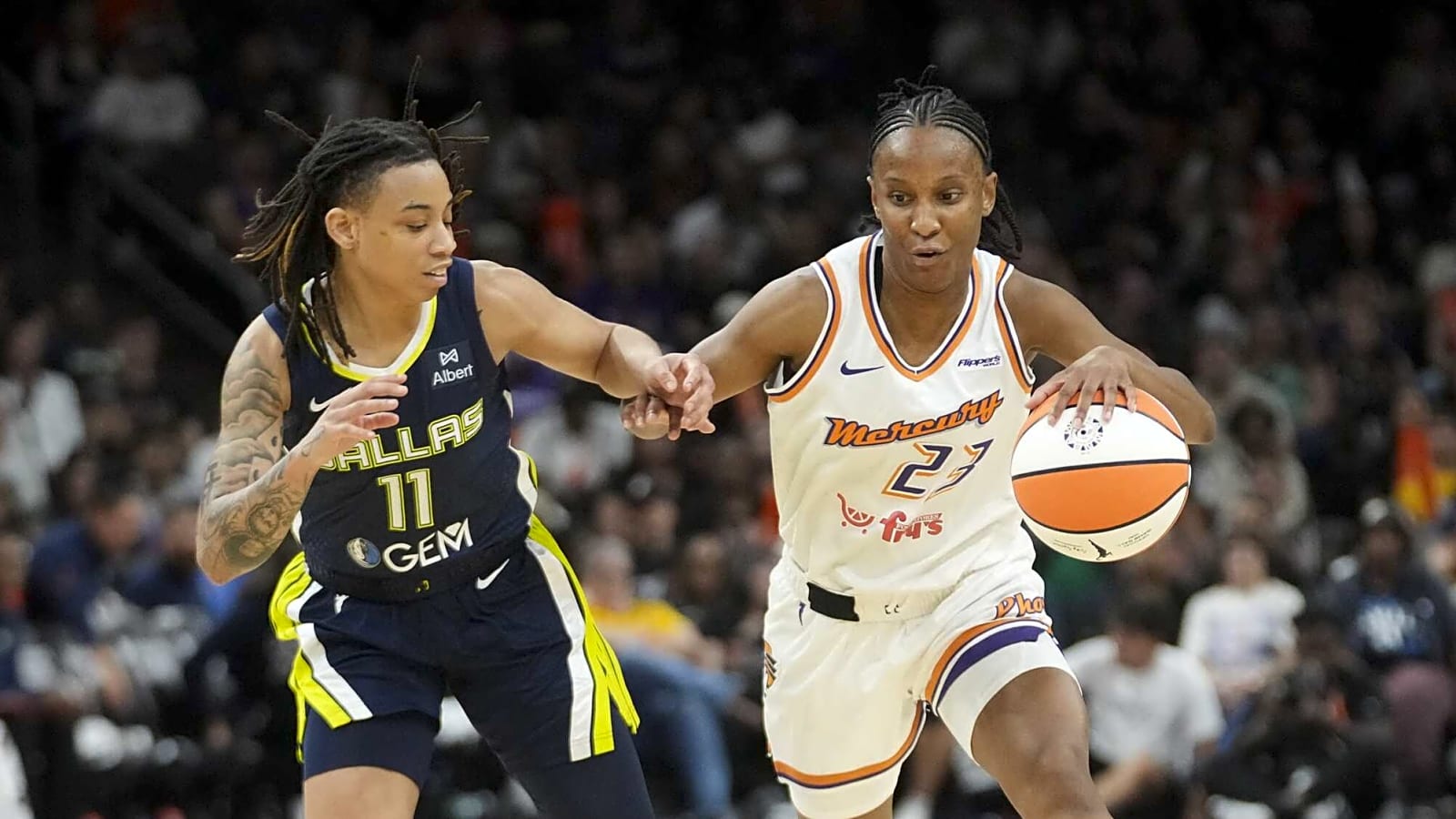
The Dallas Wings entered Monday night’s matchup at PHX Arena riding the momentum of a 98-89 home win over the Phoenix Mercury just four days earlier. But the rematch delivered a stark reversal.
Sami Whitcomb erupted for 36 points and Alyssa Thomas recorded a triple-double with 15 points, 15 assists, and 10 rebounds to lead the Mercury to a 102–72 victory. Phoenix improved to 13–6 on the season, while Dallas dropped to 6–14, suffering its most lopsided loss of the year in a game that unraveled quickly and never settled. However, the Wings have won four consecutive home games but are now 2-8 on the road.
Rookie guard JJ Quinerly led the Wings with a career-best 18 points, including four made threes, and added five assists. Aziaha James continued her consistent stretch with 15 points, her seventh straight game in double figures. Teaira McCowan contributed nine points and matched a game-high with 10 rebounds. Paige Bueckers and Myisha Hines-Allen each chipped in 11 points, but it wasn’t enough to offset Phoenix’s dominance on both ends of the court.
Whitcomb Sets the Tone as Phoenix Pounces Early
From the opening tip, the Mercury came out firing—led by a blistering first-quarter performance from Whitcomb, who poured in 19 of her 36 points in the opening frame. She shot 7-of-9 from the field and 4-of-5 from deep in the first 10 minutes alone, fueling a 28–19 lead for Phoenix.
“She’s just so good on the move,” Wings head coach Chris Koclanes said. “Early on, we went under some screens, and once she sees one go in, the rim just gets bigger. She stepped up and played incredible.”
Whitcomb’s impact extended beyond just her scoring. Her presence in dribble handoffs with Thomas as the orchestrator, along with off-ball movement, forced Dallas into constant rotations, which often left other shooters open or created mismatches for Phoenix to exploit later in the game. Even when she wasn’t shooting, the Mercury used her gravity to generate space, especially in early actions and dribble handoffs that led to breakdowns across multiple matchups.
Bueckers said the team had prepared for those scenarios in the scout, but didn’t execute them consistently enough.
“They made some tough, contested threes,” Bueckers said. “But once they got hot, we needed to adjust—run them off the line and make them take shots within the arc.”
Phoenix shot 55% in the quarter while holding Dallas to 40% from the field and just 20% from three. Seven Wings registered points, but none scored more than five in the opening period. The Wings’ starters struggled to get into a rhythm as the Mercury shrunk the floor and neutralized early drives by rotating behind the play and crashing the glass.
Dallas Rallies Briefly, but Mercury Reasserts Control
The Wings showed some pushback in the second quarter, trimming the deficit to six after a 6–0 spurt led by Aziaha James. The rookie guard hit a tough pull-up jumper off the dribble and followed it with a left-wing drive that drew defenders and created an open look for a teammate. Her aggression sparked momentum, but just as quickly, Phoenix answered with a 6–0 run to re-establish control. The Mercury eventually stretched the lead to 15 and entered the break up 52–39. Whitcomb had 29 points at halftime.
“We were one step late on everything,” Luisa Geiselsöder said postgame. “They were hitting—I don’t even know what percentage—but it felt like everything. We also gave them some easy shots early on. We let Sami get hot, and I think we could’ve done a better job stopping that.”
Despite the deficit, Bueckers and James kept Dallas afloat offensively. Bueckers reached double figures with 11 by halftime, while James had 10. Both tried to combat Phoenix’s ball pressure by getting downhill and drawing help. But the Mercury’s help-side defense was sharp, consistently cutting off driving angles and forcing Dallas to make quick reads in tight windows.
“They were aggressive,” Bueckers said. “They got into passing lanes, were great in transition, and got deflections. Kalani was always lurking, Mac was always lurking, AT is always lurking—they did a really good job of helping and protecting the rim.”
Even during its better stretches, Dallas struggled to string together clean possessions. Phoenix’s defense shrunk the floor and funneled drives into length. The Mercury also stayed disciplined with their communication, rarely overcommitting when the Wings tried to drive and kick.
The Wings were able to keep the game within reach through effort and hustle, but never fully seized momentum. The second quarter showed flashes of what Dallas is capable of—especially with James creating off the bounce—but Phoenix’s experience and control continued to win out.
Third Quarter Collapse, Phoenix Runs Away
The decisive stretch came midway through the third quarter when Phoenix unleashed a ruthless 19–0 run, ballooning a manageable game into a blowout at 71–42. The Mercury’s onslaught came from all angles—Whitcomb’s continued movement off the ball, Thomas’ orchestration from the elbows, and Kalani Brown’s finishing around the rim. Dallas was held scoreless for over six minutes, struggling to generate quality looks and failing to get stops in transition.
Hines-Allen finally ended the drought with a three-pointer from the right wing. Moments later, McCowan knocked down just the second three-pointer of her WNBA career from the top of the key, a rare highlight in an otherwise disjointed quarter. But by then, the damage had been done.
Phoenix outscored Dallas 30–17 in the third. The Wings shot just 27.8% in the frame, missing nine of their first 10 attempts before connecting late. Despite going 4-of-8 from three in the quarter, the team struggled to find rhythm or create consistent half-court offense, often settling for perimeter looks after Phoenix collapsed the paint.
McCowan led Dallas with eight points in the period. Her interior presence helped stabilize the team briefly, but Phoenix’s relentless pace and execution overwhelmed the Wings’ young rotation.
“They’re a veteran team with championship aspirations,” Koclanes said. “They responded at home after a road loss, and our rookies got to live through that. They didn’t know what was coming until it hit them. That experience matters.”
Koclanes also emphasized the learning opportunity in that moment. “That third quarter showed the difference between being locked in and just competing,” he said. “It was a reminder for us. We have to grow through it.”
Rookies Flash Late but Can’t Close the Gap
JJ Quinerly came alive in the fourth quarter, scoring eight of her team-high 18 points. James added five more to continue her consistent scoring run. Dallas briefly trimmed the deficit with an 8–0 run bridging the third and fourth quarters, forcing a Phoenix timeout. But the Mercury, composed and seasoned, quickly responded with a 12–5 stretch to close the door.
Quinerly said she felt the tide turn once Phoenix collapsed the paint and dared Dallas to hit from the outside. With driving lanes cut off and help defenders rotating early, the Wings were forced into more perimeter looks and struggled to convert consistently.
She noted that the Mercury’s physicality and anticipation disrupted Dallas’ offensive flow and made it difficult to regain rhythm. The shift in spacing not only stalled their attacks but also allowed Phoenix to control the tempo for the rest of the game.
“They congested the paint,” Quinerly said. “We did get a couple of kick-out threes, but sadly we couldn’t hit ’em. That’s the game of basketball—we’ll be back.”
Despite the loss, Quinerly’s performance stood out. Her four-made threes were a career-high, and she also led the Wings in assists with five, showcasing her growing confidence when the opposition is going under on screens, daring her to shoot. As teams continue to respect her as a threat to use her speed to get to the rim, she will have to counter to open the game up for her greatest strength.
“Toward the end, I was getting downhill, and then the three-ball started to fall,” Quinerly said. “That was good to see, but we still took the loss, so we’ve definitely got to come back better in the next game.”
Leadership, Support, and Perspective Amid Growing Pains
The defeat came in the Wings’ second game with their current eight-player rotation. Injuries have sidelined Arike Ogunbowale, DiJonai Carrington, Tyasha Harris, and Maddy Siegrist, forcing Koclanes to rely on rookies not just for depth but as nightly starters.
Koclanes said the focus remains on development and internal growth, even amid a tough stretch defined by injuries, inexperience, and fluctuating rotations. He reiterated that while the losses are frustrating, especially in games where the margin becomes overwhelming, the long-term vision for the Wings hasn’t changed. Every game, win or lose, is viewed as a chance for the young core to gain valuable reps.
“You challenge them and make them aware—they already knew we weren’t ready,” Koclanes said. “But you also have to recognize this is a long season. You need short-term memory, keep learning, and continue to pour into them. It’s about infusing confidence and transferring belief. This group will respond and get better.”
Bueckers echoed that sentiment, acknowledging the sting of the defeat while maintaining a forward-looking perspective. She emphasized the importance of self-reflection and accountability in the aftermath of such a lopsided loss, stressing that the team must learn from the experience without allowing it to define them.
“You recognize this isn’t our identity, but you also have to look in the mirror and ask how we can be better—as individuals and as a team,” Bueckers said. We’ll process this loss and take what we can from it, but also move forward and be ready for the next one.”
The rookie guard also acknowledged the emotional impact of fan support after a rough night: “That means a lot. I’m just super grateful. Thank you.”
Geiselsöder said the team has to replicate its home energy while on the road.
“It’s always harder playing on the road,” Geiselsöder explained. “But it comes down to finding our own motivation and that hunger to go out and compete. I think we have it—we just have to bring it from the start.”
Veteran Perspective, Team Growth, and Rotation Adjustment
Liatu King, who joined the team midseason, acknowledged the difficulty of integrating into a new system but praised the support from teammates and coaches.
“Coming in during the middle of the season, they already have a groove going,” King said. “So just trying to figure out where you fit is a little tough, but that takes time. Getting to know your teammates and being genuine with them—getting to know them outside of basketball—really helps.”
She added, “I love the girls here. They’re super active and welcoming. Nobody’s standoffish. Everybody made me feel really welcome.”
McCowan, reflecting on the young core’s development, praised their maturity and growth throughout the season. She noted that the rookies have embraced their roles with humility and professionalism, consistently showing a willingness to learn and compete.
“They want to learn, they’re eager to learn, and they’re not full of themselves,” McCowan said. “They’re just coming in with grace and they’re humble. That’s what I love about them — just going out, playing, really just stealing minutes, stealing a spot.”
McCowan also addressed the broader trajectory for the team, highlighting how the group has begun to establish chemistry despite the constant lineup changes and influx of new faces. She acknowledged that it hasn’t been easy to integrate so many different playing styles and personalities, but credited the team’s recent improvement to a collective effort to gel and understand one another on and off the court.
“It’s a lot of new pieces,” McCowan explained. “Normally when you go to a team, it’s like one or two new pieces — maybe. But a whole team full of new pieces? And everybody has a different playing style. So just getting together and figuring it out, gelling together, finding out who likes the ball where, who likes what. I think that was just the part we were missing a little bit, but we’re finding it as of lately.”
Looking Ahead: “We Owe Chicago One”
The Wings now turn their attention to Wednesday’s matchup against the Chicago Sky at Wintrust Arena. The Sky have beaten Dallas twice this season, and the Wings know the opportunity ahead.
“We’re about to play Chicago—a team we owe,” Hines-Allen said. “They’ve beaten us twice, and we know they’re coming out hungry, too, after a tough loss to Minnesota. But we’re hungry as well.”
The message internally is clear: learn from the mistakes, but don’t dwell.
“We’ve got to come out with that dog mentality and show defensively that we’re not backing down,” Quinerly said. “Moving into the next games, we’ve got to make a stand immediately—starting in the first quarter.”
Tipoff in Chicago is scheduled for 7 p.m. CT on Wednesday. The game will air locally on KFAA29 and stream on WNBA League Pass.
More must-reads:
- Angel Reese extends impressive streak in loss to Lynx
- Joey Logano still chasing trophies ahead of his 600th NASCAR start
- The 'No. 1 overall MLB Draft picks' quiz
Breaking News
Trending News
Customize Your Newsletter
 +
+
Get the latest news and rumors, customized to your favorite sports and teams. Emailed daily. Always free!








